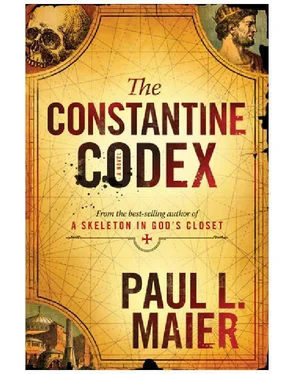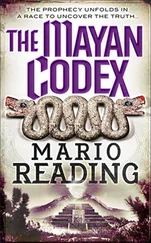Paul Maier - The Constantine Codex
Здесь есть возможность читать онлайн «Paul Maier - The Constantine Codex» весь текст электронной книги совершенно бесплатно (целиком полную версию без сокращений). В некоторых случаях можно слушать аудио, скачать через торрент в формате fb2 и присутствует краткое содержание. Жанр: Триллер, на английском языке. Описание произведения, (предисловие) а так же отзывы посетителей доступны на портале библиотеки ЛибКат.
- Название:The Constantine Codex
- Автор:
- Жанр:
- Год:неизвестен
- ISBN:нет данных
- Рейтинг книги:5 / 5. Голосов: 1
-
Избранное:Добавить в избранное
- Отзывы:
-
Ваша оценка:
- 100
- 1
- 2
- 3
- 4
- 5
The Constantine Codex: краткое содержание, описание и аннотация
Предлагаем к чтению аннотацию, описание, краткое содержание или предисловие (зависит от того, что написал сам автор книги «The Constantine Codex»). Если вы не нашли необходимую информацию о книге — напишите в комментариях, мы постараемся отыскать её.
The Constantine Codex — читать онлайн бесплатно полную книгу (весь текст) целиком
Ниже представлен текст книги, разбитый по страницам. Система сохранения места последней прочитанной страницы, позволяет с удобством читать онлайн бесплатно книгу «The Constantine Codex», без необходимости каждый раз заново искать на чём Вы остановились. Поставьте закладку, и сможете в любой момент перейти на страницу, на которой закончили чтение.
Интервал:
Закладка:
Jon discussed the matter with Osman. They had been in continual phone contact over the past two days. Predictably, the translator took some credit for Al Jazeera’s finally announcing the error, but he also took the wind out of his own sails by confiding his surmise as to their delay.
By dragging their feet in announcing the error-cum-correction, he told Jon, the Sunni Al Jazeera got the Shiites to make fools of themselves with their instant fatwa. “There’s just no end to the rivalry between Sunnis and Shiites.”
“You really think the grand ayatollah and his Iranian clergy are embarrassed by the fatwa?” Jon asked.
“Not embarrassed. More like mortified, I’m sure. In fact, I’ll bet that they’ll never even mention this again.”
“What! Not even to lift the fatwa?”
“Probably not. That would look like they’d made a mistake. And of course, they did! But it’s the same reason Rushdie’s fatwa was never lifted.”
“So I have to live the rest of my life with this hanging over my head?”
“Welcome to the club, Jon. Since I converted from Islam to Christianity, I’d also face a sentence of death in almost any Muslim country if I returned. But I think you can put away the worry beads. Salman Rushdie lives, as you may have noticed, and I understand that VOA and Al Arabiya have also been giving full coverage to the truth in their Farsi broadcasts. Truth will win, even in Iran.”
Jon was neither entirely convinced nor consoled.
A week later, something happened that shocked not only Jon and Shannon, but much of the Western world as well. It was a very pleasant shock. Sheikh Abbas al-Rashid-probably the most influential Muslim theologian in the world-came down on Jon’s side. Al-Rashid was the grand sheikh and imam at al-Azhar Mosque and University in Cairo, the number one Islamic theological school and the oldest university in the world. Before giving the commencement address at al-Azhar, he had alerted Al Jazeera, as well as network reporters and stringers from other nations, that they might find his remarks rather more newsworthy than was usually the case for commencement addresses.
This was enough to attract a small army of media sorts, all festooned with cameras of every description, to cover the occasion. Thousands of miles away in Weston, Massachusetts, Jon and Shannon joined the international audience in watching the televised address, which was titled “Freedom for Truth.” Al-Rashid opened by telling of an observer that the Sung dynasty in China dispatched in the year 987 to survey life in the West. When he returned home, the observer reported that the Roman Empire had fallen and been replaced by two great civilizations in the West: one was Byzantine, the other Islamic. The latter, however, was far superior to the former. Then, as an afterthought, he also told of a third-that of the Frankish kingdoms in Europe. “But they are sunk in barbarism,” he concluded.
Al-Rashid continued-in Arabic, of course, but with simultaneous translations. “The observer from the Sung dynasty was absolutely correct. Today, all scholars, both East and West, agree that Islam was the foremost culture in the entire world during the tenth through twelfth centuries. Our cities had the first universities, the first hospitals, the first public libraries, even the first fire departments. We were at the forefront of all branches of human knowledge: astronomy, physics-all the sciences, in fact-mathematics, medicine, literature… The list is endless. We preserved manuscripts of the ancient Greek and Roman philosophers that were lost in the West. Their scholars learned from us.
“Yet this is not the case today. Some even regard Islamic nations as ‘backward’ and in need of foreign help. What happened? The reasons are many, but perhaps two dominate the others. One, we were brutalized by the Mongol invasion when Baghdad, the center of the Islamic world, fell in 1258. But the second reason, I think, is even more significant: our academic freedoms were curtailed from that time on. In later centuries, our most creative minds were constrained by intellectual blinders, fresh ideas were suspect, and our scholars were no longer at liberty to pursue truth for its own sake. Islam and the teachings of the Prophet-may Allah’s peace and blessing be upon him-were by no means responsible for this, but narrow minds that claimed to speak for Islam were.”
Al-Rashid went on to cite passages from the Qur’an that stressed the importance of free inquiry and tolerance, such as Sura 2:256-“In religion, there is no compulsion”-and how later on, stringent mullahs tried to explain away such verses. He then lashed out at the current fanaticism and violence fostered by Islamic fundamentalists and jihadists that not only endangered the world but were an insult to Islam itself.
He capped his argument with a powerful illustration. “Lest you think that this is not the case today, I would call your attention to what happened very recently. The Arabic edition of a book by a well-known American professor, Jonathan P. Weber of Harvard University, contained a misprint or innocent error that has since been corrected. And yet this professor was instantly attacked by today’s mullahs, and fanatic mobs inspired by them caused riots in various countries that led, tragically, to some deaths. Not only that, but straining all canons of logic, a fatwa was even issued against the professor, which should immediately be lifted. We call on our Shiite brothers in the faith to nullify that fatwa.”
“Jon, did you hear that?” Shannon asked unnecessarily.
Jon himself was speechless. What a magnificent development-in fact, a true answer to prayer! If the fatwa were lifted, their summer plans were intact once again.
The university imam closed with an appeal that Islam resurrect its past glories and world cultural leadership by returning to the path of free inquiry, which alone could lead to truth itself in all fields of human knowledge. His final words, of course, were the formulaic “All praise be to Allah, the Lord Sovereign of the universe, and may Allah praise his Prophet Muhammad and his household.”
Moments of stunned silence followed, and then deafening applause erupted, especially from the students, with shouts of “Allahu Akhbar! Allahu Akhbar!” “God is great! God is great!” Of the seventy-five al-Azhar faculty members sharing the platform that day, some were smiling, while others wore frowns of deep concern.
Jon shook his head. “It’s the finest address by a Muslim that I’ve ever heard-and certainly the best since 9/11. This is the voice of moderate Islam that should have been much louder following what happened in New York and Washington. What a man! I’ll bet the archconservatives in the Islamic world cordially hate him.”
“Do you think it’ll take some of the heat off of us?”
“It certainly should, Shannon. It looks like we may be heading for Greece and Turkey after all.”
They called Washington the next morning and discussed the matter with Morton Dillingham of the CIA. He was his usual cautious-perhaps paranoid-self. Jon was sure there must be a plaque on his office wall that read, The light at the end of the tunnel is an approaching freight train. Yes, he admitted that the climate had improved for Jon since the now-celebrated commencement address by al-Rashid. He also reported that the CIA operatives in Tehran had reported very little public follow-up on the fatwa issue. It was no longer news there, and there were no further riots.
“Then it should certainly be safe for my wife and me not to alter our plans for Greece and Turkey, right?” Jon asked.
“Oh, I’m not sure that’s the case,” he demurred. “It only takes one fanatic, one unstable-”
“We’re fully aware of that threat, Mr. Dillingham, but our decision is to go ahead with our plans in any case.”
Читать дальшеИнтервал:
Закладка:
Похожие книги на «The Constantine Codex»
Представляем Вашему вниманию похожие книги на «The Constantine Codex» списком для выбора. Мы отобрали схожую по названию и смыслу литературу в надежде предоставить читателям больше вариантов отыскать новые, интересные, ещё непрочитанные произведения.
Обсуждение, отзывы о книге «The Constantine Codex» и просто собственные мнения читателей. Оставьте ваши комментарии, напишите, что Вы думаете о произведении, его смысле или главных героях. Укажите что конкретно понравилось, а что нет, и почему Вы так считаете.












